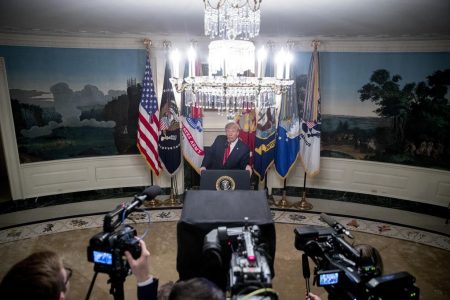
Islamic State statements portray terrorist group as intent on exacting revenge
When the Islamic State finally broke its silence about the killing of Abu Bakr al-Baghdadi, it did so with a 1,200-word communique that included Koranic verses, florid tributes and one very specific warning: Americans would pay for the death of the terrorist group’s leader.
“Do not get too joyful or arrogant,” the statement issued Thursday by the Islamic State’s al-Furqan media outlet said. Referring to the group’s newly appointed chief, it added: “Someone has now come to make you forget the horrors [that you already] have seen, and the cups of bitterness that you have tasted.”
The statement was a more formalized version of a threat that has been echoed dozens of times in the past week on social media platforms used by Islamic State supporters around the world. With words, and sometimes doctored images and illustrations, the militants have vowed to exact revenge for Baghdadi’s death on Oct. 26 at the hands of U.S. Special Operations forces in northwest Syria.
While such threats are a common feature of Islamic State propaganda, the recent statements reflect what some analysts say is an especially intense reaction to how Baghdadi’s death was presented to the world. President Trump’s characterization of Baghdadi as a “dog,” and his description of the terrorist’s “whimpering” in his final moments have been cited repeatedly in online chat rooms used by the group’s supporters.
In the days since the operation, Pentagon leaders have said they were unable to confirm Trump’s depiction of Baghdadi, who detonated a suicide vest after he was discovered in a tunnel, killing himself, several adults and at least two children, officials say.
Although Baghdadi’s death was a heavy blow, it also appears to have provided the Islamic State’s followers, at least temporarily, with both a cause and a “rallying cry” that has “energized the jihadi world” after months of relative quiet following the collapse of the group’s self-proclaimed caliphate, said Steven Stalinsky, executive director of the Middle East Media Research Institute, a Washington nonprofit organization that monitors social media platforms used by extremist groups.
“It is prompting calls for revenge and attacks, which unfortunately will lead to at least attempts at attacks,” Stalinsky said. “Jihadis around the world are now galvanized, on the alert, and have something concrete to focus on.”
Whether significant attacks are more likely to happen is unclear, as the terrorist group has a mixed record on carrying out its threats. In past years, the Islamic State’s warnings of pending attacks during Ramadan were followed by a campaign of bloody strikes in Middle Eastern and European cities. But more recently, the group was unable to carry out a highly specific threat to disrupt last year’s World Cup games in Moscow.
“ISIS doesn’t have any new capabilities it didn’t have a week ago,” said Rita Katz, founder of the Maryland-based SITE Intelligence Group, which tracks Islamist groups’ online activity. She said, however, that Baghdadi’s death and the naming of his successor “has certainly energized the ISIS community.” ISIS is a common acronym for the Islamic State.
Even after losing its territorial holdings — the self-proclaimed caliphate that in 2015 occupied a swath of territory the size of Britain — the Islamic State retains between 14,000 to 18,000 fighters in Iraq and Syria alone, according to a Pentagon report earlier this year. That doesn’t include affiliated organizations scattered across a dozen countries from North Africa to South Asia to the Far East.
“We have to, unfortunately, expect that ISIS will soon try to strike back as a retaliation for the killing of Baghdadi,” said a Middle Eastern intelligence official who spoke on the condition of anonymity to discuss counterterrorism assessments.
Of the group’s new leader — a little-known figure identified in Thursday’s communique as the “scholar” Abu Ibrahim al-Hashimi al-Qorashi — the official said, “Now he will have to prove his leadership via vendetta or an attack that will also give him the credibility as a military leader.”
One self-described member of the Islamic State, who spoke to The Washington Post over an encrypted messaging channel, specifically cited Trump’s remarks about Baghdadi as having enraged others in the group and spurred calls for revenge. While the man’s connections to the group could not be independently verified, his remarks echoed postings that have appeared on pro-Islamic State social media sites since last weekend.
“We are following very closely what Trump said about the operation,” said the man, who spoke on the condition of anonymity citing the risk of reprisals by rival groups or others. “We did hear how he described the caliph as weak and crying. We are going to make sure to show one day how Americans will cry and beg for their life.”
But such dire assessments were not uniform across the spectrum of Islamist groups, many of which of have clashed ideologically and sometimes violently with Baghdadi and his followers.
Source: Washington Post





